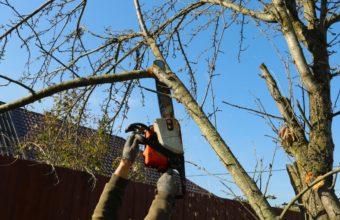Vinegar, particularly in its household form, is often touted as a natural alternative for various gardening tasks, including weed control. When it comes to rotting a tree stump, the effectiveness of vinegar is limited, especially if you’re using regular household vinegar, which typically has a 5% acetic acid concentration. This concentration is not strong enough to significantly degrade or rot a tree stump.
Here’s some important information to keep in mind…
Vinegar’s Effectiveness
- Limited Impact – Vinegar might kill some of the smaller vegetation or sprouts coming from a stump due to its acidic nature, but it’s unlikely to have a substantial effect on rotting the stump itself.
- Industrial Vinegar – Stronger vinegar solutions, such as horticultural vinegar, which can have an acetic acid concentration of 20% or higher, are more potent and can be more effective at killing plants and weeds. Even at higher concentrations, vinegar primarily affects the surface and is still unlikely to penetrate deeply enough into a tree stump to cause it to rot.
Accelerating Stump Decomposition
If you’re looking to accelerate the decomposition of a tree stump naturally, there are more effective methods than vinegar:
- High-Nitrogen Materials – Applying a high-nitrogen fertilizer or substances like blood meal can help speed up decomposition by promoting microbial growth.
- Keep It Moist – Keeping the stump moist (but not waterlogged) can also encourage fungal growth, which aids in decomposition.
- Drill Holes – Drilling holes in the stump and filling them with compost, manure, or a specific stump removal product can introduce decomposing agents directly into the wood.
- Cover with Soil or Mulch – Covering the stump with soil or mulch can keep it moist and promote fungal growth, aiding in decomposition.
Professional Removal Methods
For a quicker solution, you might consider professional stump removal methods:
- Stump Grinding – This mechanical method removes the stump by grinding it into wood chips, which is quick and effective but requires specialized equipment.
- Chemical Stump Removers – These products often contain potassium nitrate and accelerate decomposition by increasing the wood’s porosity and promoting fungal growth. They’re more effective than vinegar but require patience, as they still take several months to work.
Conclusion
While vinegar, especially household vinegar, is not effective for rotting a tree stump, there are alternative natural and chemical methods for stump removal or acceleration of the decomposition process. For immediate removal, mechanical methods like stump grinding are the most effective but also the most costly.






